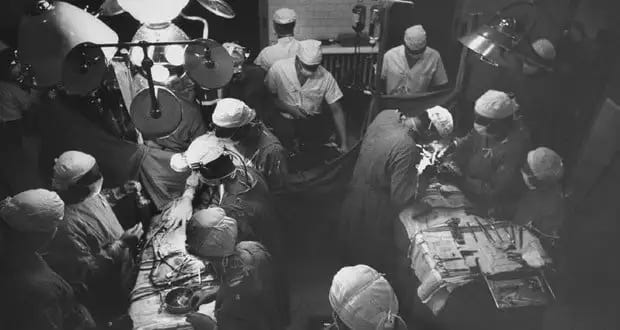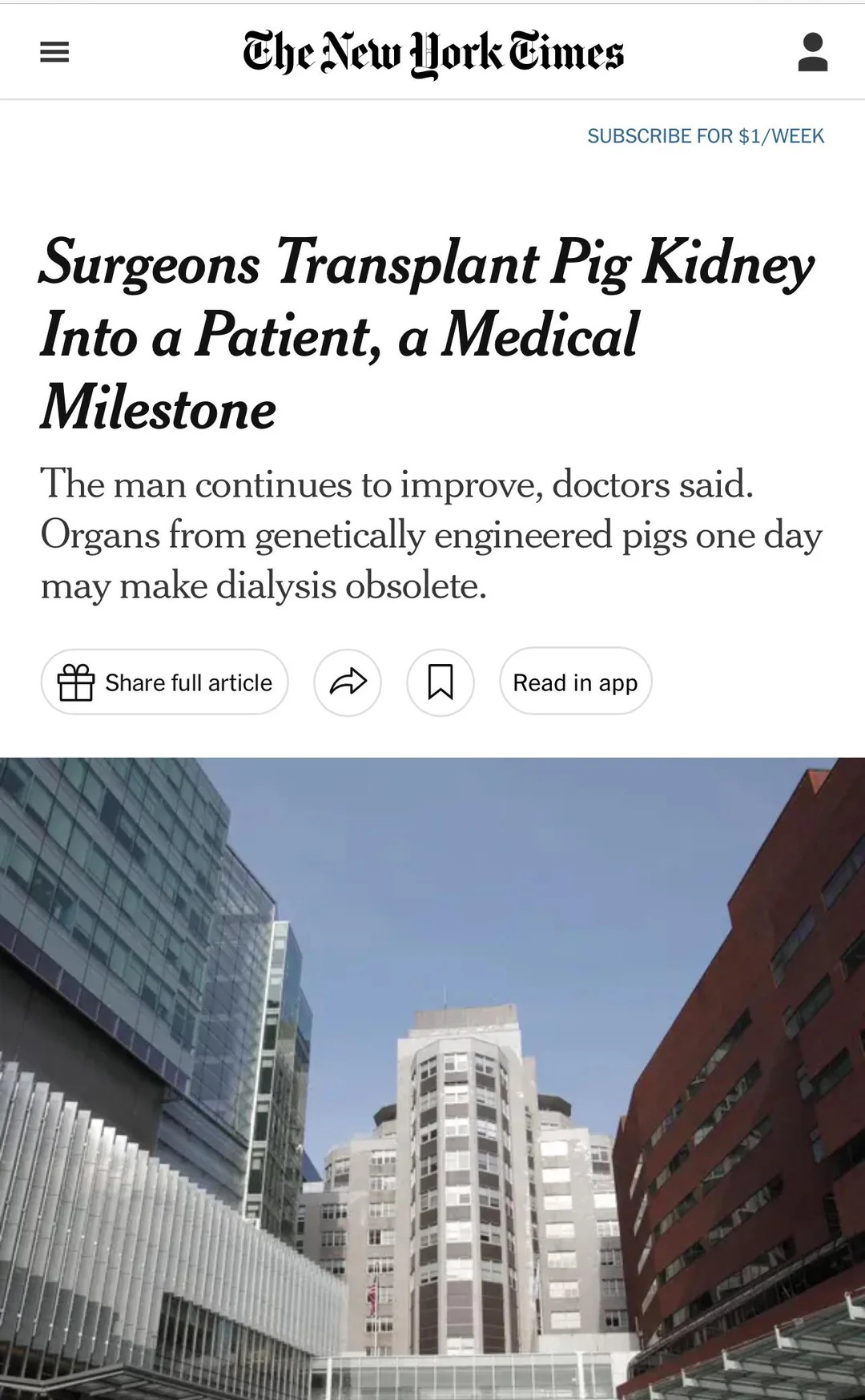A Call To Be More American
Cowboyism
Europe has long-lost its dynamism, it is now a big lumbering behemoth bumbling through modernity. It dreams and wishes to have the same technological and entrepreneurial culture as America. Yet, its attempts to do so are nothing but cargo-cult imitations of what truly drives the gears behind the American technological machine. That driving force, is Cowboyism.
This would be classed as being bold and brave, with a strong influence of the frontiersman spirit added in to the mix. Indeed, is science not the modern frontier? There are many examples of this culture driving towards the creation of new technological ground, in modern times, I think SpaceX. Overturning half a century ‘‘experience’’ of delivering payloads to earth orbit exemplifies this.
If I make a list of medical device innovators from 1950 until now, 70% (19/27) are US based.
The Medical Cowboys
April 1954, Minnesota Medical School, C. Walton Lillehei connected the circulatory systems of the 25-year old father to his 3 year-old son. In this way, the father could breathe and beat for his boy and Dr Lillehei could correct the large ventricular defect in the boys small heart.
A year prior to this, in Philadelphia, John Heysham Gibbon used his heart-lung machine (then a rudementary device) to perform the first open heart surgery.
Both innovators are of the special class of humans I refer to as Demigods. Those who have usurped some power from the divine. For where at first there was death, and only death, there was now life.
If I make a list of such people (medical device innovators in this case) from 1950 until now, 70% (19/27) are from the United States. Two people, Willem Kolff and Andreas Gruntzig started their work in Europe, but then left for the US. In the case of Willem Kolff the story is complicated by the post-war reconstruction. But one of the factors was the resistance from the Dutch medical community to Kolff's radical new paradigm. A paradigm that involved pumps, membranes, tubes and such.
For Adreas Gruentzig the story is quiet clear. In the late 1960s, Gruentzig learned of the angioplasty procedure developed by Charles Dotter, an American, at a lecture in Frankfurt. But he had bureaucratic troubles with developing the technique in Germany. So he moved to Switzerland in 1969. At the end of the 70s
‘Gruentzig was contemplating a significant change in his career because he had become frustrated with the slow pace of his efforts in Europe compared to the United States.’
and so in 1980 he moved.
Here is the list of innovators:
The Pigboys
Now a lot of the innovation I remarked above is fairly old. Perhaps this means we are not innovating that much when it comes to medical devices anymore, which is certainly the case for dialysis! Or indeed science in general (Scott has a nice article on this). However aside from the pure engineering domain (i.e. SpaceX, driverless vehicles etc) there is more recent happenings in the medical domain. Happenings that could lead to earth shattering results. The headlines read:
Not only did they transplant a pig-kidney in to a person. But they also transplanted a pig-thymus and pig-kidney in to another, just a month later. However, sadly Mr Rick Slayman passed away (not releated to the kidney), and Mrs Lisa Pisano had to have her kidney taken out due to perfusion issues. But, its important to note that both these people were very ill with heart failure. So it is not surprising that the treatment failed as it did. Both are highly commendable individuals and truly embody the frontierman spirit. The Americans have shown that in principle, it can be done, with more work and effort we can really have something here that can produce tissues not just for kidney disease, but any.
And yet there is opposition from animal rights activists, who are quiet influential in NL, and Europe in general. Now it is not that there is no initiative. Prof. Dr. Eckhard Wolf is the man leading the Europeans on this front. I find this highly commendable given that the Guardian writes
‘February 2019, a petition by German pressure group Doctors Against Animal Experiments demanding a ban on xenotransplantation research collected over 57,000 signatures
Progress under these conditions is hard and getting harder, but not impossible! I talked to Prof. Wolf earlier this week. I was quiet happy that he was able to make time in between his schedule. He informed me that Germany has supported his pre-clinical research with baboons. And that he believed his work to be at a better place than the Americans who were limited by the nature of their source animals.
Having said this, I think we will still be at-least 4-6 years behind the Americans on the clinical trial level, this is very significant. That is if there is even funding. Apparently, there is less will for private investors to take risk, compared to their American counterparts.
You did your best, but an investment didn’t pay out? Thats a part of the game, perhaps someone else can do better. Its not a tragedy that must be prevented from ever happening again.
In this regard, the state was also less willing to interfere at the clinical trial stage where in principal it thought that the private enterprise should take up the issue. I think this is somewhat misguided given that the work is indeed at a very early stage and the technology is not ‘the run of the mill drug xxx-xxx-xx‘ to be tested by big-pharma.
I don’t think the risk aversion is a money issue. I think its a culture issue. The Americans do not take risk because they think its the cool thing to do. Its because they have learned that taking calculated risks for potentially very high impact technologies have positive expected returns (something that could be said about the founding of their country!). If it didn’t, they would have run out of the money. You did your best, but an investment didn’t pay out? Thats a part of the game, perhaps someone else can do better. Its not a tragedy that must be prevented from ever happening again.
The Artificial Kidney
I am fortunate enough that the Americans have yet again led the way. The groups of Profs William Wissel and Shuvo Roy have stuck at it, and have been working steadily towards the Artificial Kidney. There are some criticism that I can level at them for being ‘‘too American’’, but I cannot take away their hard work and commitment. Indeed, without the cowboyism that it took to conceive and follow through on the idea from the Americans, it would have been impossible to acquire any money from the European Union on this for our own current research project.
Americans Innovate, We Regulate
The European modus operandi is sadly ‘‘Americans innovate, we regulate’’. This is a very uninspiring place to be and emblematic of our lethargy. The bureaucrat is truly the opposite of the cowboy.
GDPR has been a huge hindrance on research for instance. The idea is nice, to protect the data of private citezens. In practice those that the data is meant to be protected from, have the means to collect is quiet easily anyway. In the end, it makes any kind of human oriented research very difficult.
Heart rate as personally identifiable data
When I first started my research in human factors area, I didn’t need too much in the way of a data management. That slowly increased over time to a point where it had become a major burden. For others, it was even worse! When I was interacting with car companies for motion sickness research, I was their outsourcing lab because their legal framework in Germany was even more rigid when it came to GDPR. To a level where they considered heart rate as personally identifiable data!
In the Netherlands our framework for animal experiments is more conservative than in Germany. Where the work becoming harder and harder, and more expensive by the year. Same is true for any kind of patient oriented research, surveys being the most frustrating example. Lastly (for now) working with any kind of animal tissue in a non-medical/bio affiliated lab is very difficult. I know of PhD students who can’t include the work they did using store bought meat in to papers because technically their lab at the technical university is not licensed for it.
For some reason a lot of people take these bureaucratic hurdles to research seriously. As if this is the true way things are ought to be done. To aspire to the work of those Demigods usurping divine power over life and death? No. Orderly generation of more and more paperwork to consider further and further removed externalities, as well as the conformation of your work to dubious ethical standards. This, is the only way for a proper researcher to do things.
Conclusion
I think Europe does have people with the frontiersman spirit. There are cowboys. I have the pleasure of working with a bunch of them on the daily. But they are heavily curtailed by the society and the regulatory framework they have to work with and so have to tail the Americans.
Not only does this take us to the back-end of any innovation, but innovation may not come to us at all due to aforementioned pressure groups and dogmas. There are real consequences to being left behind on the technology game.
[There are a lot of nuances missing from this post but I don’t want to make things too long. Follow up post will be titled ‘‘A call to not be too American’’ see book ‘‘How to make a Killing’’. I also have taken the two places as big homogenous blobs which is definitely not the case. I want to later talk more on the regulatory burden in more detail]






